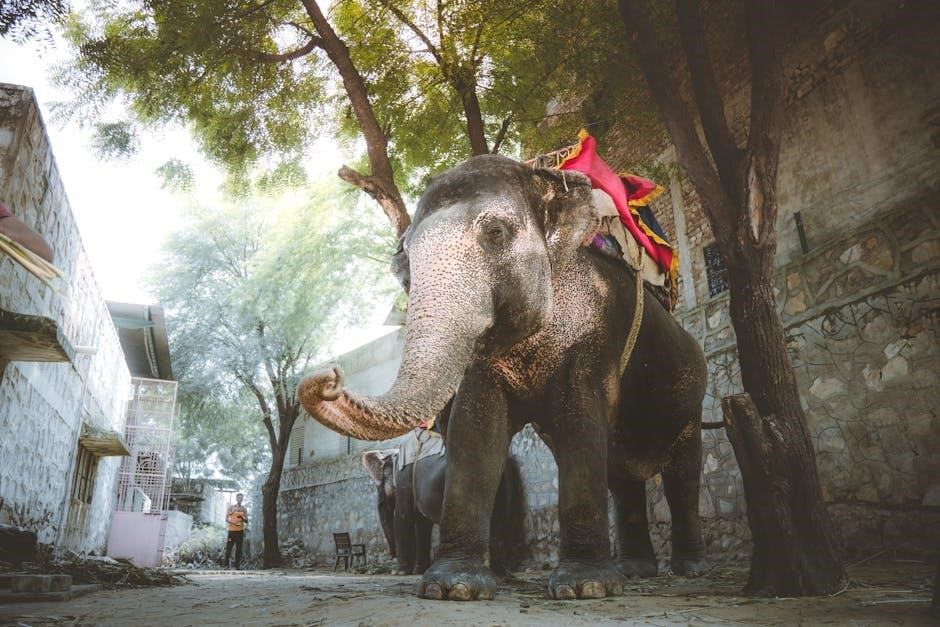George Orwell’s “Shooting an Elephant” is a thought-provoking essay exploring themes of imperialism and moral conflict․ Published in 1936, it recounts Orwell’s experiences as a colonial officer in Burma, where he faced immense societal pressure to shoot a rampaging elephant․ The narrative delves into the psychological and ethical dilemmas of colonialism, offering a critique of imperial power dynamics․ The essay is widely available as a free PDF, making it accessible for educational and personal reading․
1․1 Background Information on “Shooting an Elephant”
George Orwell’s “Shooting an Elephant” is a semi-autobiographical essay based on his experiences as a sub-divisional police officer in Burma during the 1920s․ Orwell, whose real name was Eric Arthur Blair, served in British colonial administration, which deeply influenced his perspective on imperialism․ The essay reflects his growing disdain for colonial rule and the moral complexities it entailed․ Published in 1936 in the literary magazine New Writing, it captures Orwell’s internal conflict when pressured by locals to shoot a rampaging elephant, despite his reluctance․ The essay is often interpreted as a critique of imperialism and the loss of individual agency under oppressive systems․ Its historical context highlights the tensions of British colonialism in Burma, where anti-European sentiment was rising․
1․2 Historical Context of the Essay
“Shooting an Elephant” is set against the backdrop of British colonial rule in Burma during the 1920s․ This period saw heightened anti-colonial sentiment, with Burmese natives increasingly resentful of foreign domination․ As a colonial officer, Orwell witnessed firsthand the tensions between British authorities and local populations․ The essay reflects the broader context of imperialism, where colonial powers exerted control over indigenous populations, often through symbolic displays of authority․ Burma, as part of British India, experienced economic exploitation and cultural suppression, fueling resistance․ Orwell’s narrative captures the moral ambiguities and personal conflicts faced by individuals within such systems, offering a critical perspective on the human cost of imperialism and its impact on both rulers and the ruled․

Shooting an Elephant by George Orwell recounts the narrator’s moral struggle as a colonial officer pressured to kill an elephant; The essay explores themes of imperialism, power, and societal expectations, highlighting the internal conflict between personal morality and public demand․ Orwell’s narrative serves as a critique of colonialism, illustrating how authority figures are often compelled to act against their better judgment to maintain control and prestige․ The essay is a powerful commentary on the human condition under oppressive systems․
2․1 Plot Summary of the Essay
In “Shooting an Elephant,” George Orwell narrates his experiences as a sub-divisional police officer in Moulmein, Burma, during the British colonial era․ The story begins with Orwell describing the intense anti-European sentiment among the Burmese people, which isolates him and fosters resentment․ One day, a domesticated elephant, driven mad by “must,” rampages through a village, destroying property and killing a man․ Orwell is called to handle the situation and decides to shoot the elephant to restore order and avoid humiliation․ Despite his moral reservations, he is pressured by the crowd’s expectations․ The elephant’s slow and painful death haunts Orwell, symbolizing the senseless destruction caused by imperialism․ The essay ends with Orwell reflecting on the futility of his actions and the broader critique of colonial authority․
2․2 Main Conflict and Moral Dilemma
The central conflict in “Shooting an Elephant” lies within Orwell’s internal struggle between his moral values and the external pressure of colonial expectations․ As a British officer in Burma, Orwell feels compelled to shoot the rampaging elephant to maintain authority and avoid appearing weak in front of the native crowd․ However, he personally believes shooting the elephant is unnecessary and unjust, as the animal is no longer a threat․ This moral dilemma highlights the tension between individual conscience and the oppressive forces of imperialism․ Orwell ultimately succumbs to societal pressure, symbolizing how colonialism distorts moral judgment and prioritizes appearances over ethical actions․ The essay vividly portrays the psychological burden of such decisions and their broader implications for colonial rule․

Themes
The essay explores imperialism’s destructive nature, moral decay under colonial rule, and the influence of societal pressure on individual actions, revealing the complexities of human ethics․
3․1 Imperialism and Its Impact
Orwell’s essay vividly portrays the oppressive nature of imperialism, highlighting its psychological and moral toll on both rulers and subjects․ In Burma, Orwell witnesses the resentment of the local population toward British colonial authority․ The act of shooting the elephant symbolizes the senseless destruction and abuse of power inherent in imperialism․ Orwell’s narrative reveals how imperialism dehumanizes both the colonizers and the colonized, trapping them in a cycle of violence and subjugation․ The essay underscores the futility of imperial dominance, where even the smallest acts of rebellion or resistance are met with disproportionate force, further entrenching systemic oppression and moral decay․ This critique remains timeless, offering insights into the enduring consequences of colonialism․
3․2 The Role of Peer Pressure
Peer pressure plays a pivotal role in Orwell’s decision to shoot the elephant, highlighting the psychological impact of societal expectations․ Despite Orwell’s moral reservations, the crowd’s anticipation and desire to see the elephant killed compel him to act․ The pressure to conform to the role of a colonial authority figure overrides his personal judgment, illustrating how external expectations can dictate actions․ Orwell’s internal conflict reflects the tension between individual morality and societal demands․ The essay shows how peer pressure perpetuates conformity, even when it leads to morally questionable outcomes․ This dynamic underscores the broader critique of imperialism, where societal norms enforce oppressive systems․ Orwell’s experience vividly captures the power of peer pressure in shaping decisions and perpetuating systemic injustices․
3․3 Moral Decay and Guilt
Moral decay and guilt are central themes in “Shooting an Elephant,” as Orwell grapples with the ethical implications of his actions; The essay reveals how colonialism erodes moral integrity, forcing individuals to act against their conscience․ Orwell’s reluctance to shoot the elephant contrasts with the pressure to maintain authority, leading to a profound sense of guilt․ This internal conflict highlights the moral corruption inherent in imperial systems, where individuals sacrifice their values to uphold power․ The essay conveys Orwell’s regret and the psychological toll of conforming to societal expectations, illustrating the destructive nature of imperialism on both the oppressed and the oppressor․ The narrative serves as a poignant critique of the moral compromise that accompanies colonial rule․

Literary Devices
Orwell employs symbolism and irony to critique imperialism․ The elephant represents British colonial power, while irony underscores the absurdity of imperial authority and its moral contradictions․
4․1 Symbolism in the Essay
In “Shooting an Elephant,” Orwell masterfully uses symbolism to convey his critique of imperialism․ The elephant itself symbolizes the imposing presence of British colonial rule, while its death represents the destruction caused by imperialistic actions․ The narrator’s rifle serves as a symbol of authority and power, highlighting the tension between personal morality and societal expectations․ Orwell also uses the setting of Burma to symbolize the oppressive environment created by colonialism․ The crowd’s eagerness to witness the elephant’s death symbolizes the voyeuristic nature of colonial spectators․ Through these symbols, Orwell critiques the moral decay and hypocrisy inherent in imperial systems, offering a powerful commentary on the human cost of empire-building․
4․2 Use of Irony and Humor
Orwell employs irony and subtle humor in “Shooting an Elephant” to underscore the absurdity of colonialism and the moral dilemmas it creates․ The narrator’s reluctance to shoot the elephant, despite knowing it is unnecessary, highlights the irony of conforming to societal expectations․ The crowd’s excitement and anticipation of the elephant’s death serve as a darkly humorous contrast to the gravity of the situation; Orwell’s dry wit, particularly in his descriptions of the bureaucratic and societal pressures, adds a layer of irony that critiques the hypocrisy of imperialism․ These elements not only enhance the narrative’s tension but also deepen the reader’s understanding of the moral decay inherent in colonial systems․ Through humor, Orwell makes the critique of imperialism more accessible and poignant․

Character Analysis
The narrator, a colonial police officer, struggles with internal conflict, revealing his moral decay under imperialism․ The elephant symbolizes British dominance and the futility of colonial power․
5․1 The Narrator’s Internal Struggle
The narrator in “Shooting an Elephant” by George Orwell faces a profound internal struggle as a colonial police officer in Burma․ He is torn between his duty to maintain British authority and his personal morality, which opposes the senseless killing of an elephant․ The pressure from the crowd pushes him to act against his conscience, highlighting the corrupting influence of imperialism․ This internal conflict culminates in his decision to shoot the elephant, driven by fear of appearing weak rather than necessity․ The act leaves him with deep regret, illustrating the moral decay inherent in colonialism and the loss of personal autonomy under oppressive regimes․
5․2 The Significance of the Elephant
The elephant in George Orwell’s essay serves as a powerful symbol of imperialism and its destructive nature․ It represents the British Empire’s oppressive presence in Burma, embodying the exploitation and dominance over colonized peoples․ The elephant’s rampage mirrors the chaotic impact of colonial rule, while its eventual destruction symbolizes the inevitable collapse of imperial power․ Orwell uses the elephant to critique the moral and ethical corruption inherent in imperialism, highlighting how colonialism dehumanizes both the oppressors and the oppressed․ The elephant’s death, driven by societal pressure rather than necessity, underscores the senseless violence and moral decay perpetuated by colonial systems․ Through this symbol, Orwell delivers a scathing indictment of imperialism’s legacy․

Critical Reception
Orwell’s essay has sparked debates due to its controversial nature and historical accuracy․ Critics argue over the event’s authenticity, while scholars praise its deep critique of imperialism and moral decay․
6․1 Controversies Surrounding the Essay
George Orwell’s “Shooting an Elephant” has been a subject of debate due to its controversial themes and historical ambiguity․ Critics question the authenticity of the event, with some doubting whether Orwell actually witnessed or participated in the incident․ The essay’s portrayal of imperialism and its critique of colonial practices has sparked discussions about its historical accuracy and Orwell’s personal views․ Additionally, the moral implications of killing the elephant have been a focal point of argument, with some interpreting it as a symbolic act of colonial oppression․ The essay’s availability as a free PDF has further widened its reach, making it a frequent topic of analysis in academic and literary circles․ Its inclusion in collections like “Fifty Essays” has also contributed to its enduring relevance and debate;
6․2 Reviews and Scholarly Interpretations
Scholars and critics have extensively analyzed “Shooting an Elephant,” praising its profound exploration of imperialism and moral complexity; Many interpret the essay as a scathing critique of colonialism, with Orwell’s narrative voice conveying the internal struggle of a reluctant enforcer of empire․ Bertram Wyatt-Brown highlights how the essay illustrates the psychological toll of imperial duty․ The use of humor and irony in the text is noted for its effectiveness in underscoring the absurdity and brutality of colonial rule․ Orwell’s choice of language and symbolism, particularly the elephant as a metaphor for the British Empire, has been widely studied․ The essay’s inclusion in collections like “Fifty Essays” has further cemented its status as a seminal work in 20th-century literature, with its themes remaining relevant in contemporary discussions of power and morality․

PDF and Availability
“Shooting an Elephant” is freely available as a PDF, downloadable from various educational platforms, including fadedpage․com and lernarchiv․bildung․hessen․de, in multiple formats for easy access and study․
7․1 Download Options and Formats
The essay “Shooting an Elephant” by George Orwell is widely available for download in various formats, including PDF and text files, ensuring accessibility for readers․ Users can download the essay for free from platforms like fadedpage․com and lernarchiv․bildung․hessen․de, with options to read it online or offline․ Additionally, websites such as Compusary English 5th sem offer the essay in PDF format, catering to educational needs; The availability of multiple formats allows readers to choose their preferred method of consumption, whether on e-readers, smartphones, or desktops․ These resources are particularly useful for students and scholars analyzing Orwell’s work․ The ease of access highlights the essay’s enduring relevance and popularity in academic circles․
7․2 Study Guides and Educational Resources
Supplementing the “Shooting an Elephant” PDF, numerous study guides and educational resources are available to enhance understanding and analysis of the essay․ Platforms like Study Guide for George Orwell’s Shooting an Elephant by Everand provide detailed analyses, while graphic organizers from B․ Anderson facilitate active reading․ These resources are designed to aid students in grasping Orwell’s critique of imperialism and the moral complexities presented․ Additionally, educational materials from Lingua Moderna offer structured approaches to studying the essay, making it easier for learners to engage with the text․ These resources are invaluable for both individual study and classroom discussions, enriching the learning experience and fostering deeper insights into Orwell’s work․

Writing Style
Orwell’s writing in “Shooting an Elephant” is straightforward and reflective, with a somber tone that emphasizes the moral complexities of imperialism and personal conflict․
8․1 Orwell’s Use of Language
Orwell’s language in “Shooting an Elephant” is direct, vivid, and evocative, reflecting his ability to convey complex emotions and ideas through simple prose․ His use of descriptive imagery, such as the “rampaging elephant” and the “crowd of Burmans,” creates a stark visual narrative that immerses the reader in the scene․ Orwell employs a somber and reflective tone to explore themes of imperialism and moral conflict, often juxtaposing the gravity of the situation with moments of subtle irony․ His language is precise and economical, avoiding embellishment while effectively conveying the psychological tension and ethical dilemmas he faces․ This stylistic clarity enhances the essay’s emotional impact, making it a powerful critique of colonialism and human nature․
8․2 Tone and Narrative Voice
Orwell’s tone in “Shooting an Elephant” is somber, reflective, and deeply critical, reflecting his disdain for imperialism․ His narrative voice is introspective, as he recounts his moral and ethical struggles as a colonial officer․ The essay conveys a sense of regret and irony, particularly in his reluctant decision to shoot the elephant․ Orwell’s use of first-person narration creates immediacy, drawing readers into his internal conflict․ His language is straightforward yet impactful, allowing the gravity of the situation to resonate․ The tone shifts between frustration and resignation, highlighting the absurdity of colonial expectations․ Through his voice, Orwell critiques the moral corruption of imperialism, emphasizing the loss of personal autonomy and the pressure to conform to societal demands․ This narrative approach underscores the essay’s emotional and intellectual depth․

Cultural Impact
“Shooting an Elephant” has left a lasting legacy, influencing modern literature and sparking debates on imperialism․ Its controversial nature and educational significance endure, shaping cultural discourse․
9․1 The Essay’s Legacy
George Orwell’s “Shooting an Elephant” has become a cornerstone of literary and political discourse, offering profound insights into imperialism’s moral complexities․ Its vivid narrative and critique of colonialism have resonated across generations, making it a staple in educational curricula worldwide․ The essay’s accessibility as a free PDF has further amplified its reach, ensuring its themes of power, morality, and societal pressure remain relevant․ It continues to inspire scholarly interpretations and spark discussions on ethical decision-making․ Orwell’s work not only reflects the darker aspects of colonial history but also challenges readers to question authority and conformity․ Its enduring legacy lies in its ability to provoke critical thinking about justice, freedom, and the human condition․
9․2 Influence on Modern Literature
George Orwell’s “Shooting an Elephant” has profoundly influenced modern literature by shaping narrative techniques and thematic explorations․ Its critique of imperialism and moral complexity has inspired authors to address power dynamics and societal pressures in their works․ The essay’s accessible format as a free PDF has widened its reach, making it a foundational text for writers exploring colonialism, authority, and ethical dilemmas․ Many contemporary authors have drawn parallels to Orwell’s work when examining systemic oppression and individual conscience․ The essay’s concise yet powerful storytelling has also set a benchmark for political and philosophical narratives, encouraging writers to blend personal experience with broader societal commentary․ Its enduring relevance ensures Orwell’s influence remains a driving force in modern literary discourse․
George Orwell’s “Shooting an Elephant” remains a powerful critique of imperialism, highlighting the moral decay and loss of personal freedom under oppressive regimes, resonating universally today․
10․1 Final Thoughts on the Essay
George Orwell’s “Shooting an Elephant” is a profound commentary on imperialism, revealing its destructive nature and the moral compromise it imposes․ Through the narrator’s internal conflict, Orwell illustrates how colonialism erodes personal freedom and perpetuates violence․ The essay underscores the psychological toll of serving an oppressive system, where individuals act against their conscience to maintain authority․ Its timeless themes of power, morality, and societal pressure resonate deeply, making it a significant work in understanding the complexities of colonialism․ The essay’s accessibility as a free PDF ensures its message continues to reach readers, prompting reflection on historical injustices and their echoes in contemporary society․

10․2 Relevance in Contemporary Society
George Orwell’s “Shooting an Elephant” remains remarkably relevant today, offering insights into issues like systemic oppression, moral compromise, and the dangers of unchecked power․ The essay’s exploration of imperialism’s psychological toll resonates in contemporary discussions about global inequality and colonial legacies․ Its themes of peer pressure and conformity are timeless, mirroring modern debates on societal expectations and individual autonomy․ The narrative’s focus on moral dilemmas also aligns with current conversations about ethical decision-making and the consequences of actions driven by fear or prestige․ As a free PDF, the essay continues to educate readers, prompting reflection on justice, freedom, and the enduring impact of historical injustices in shaping today’s world․




Be the first to reply